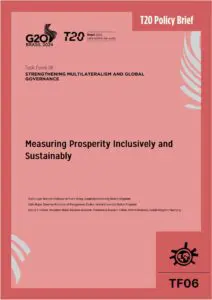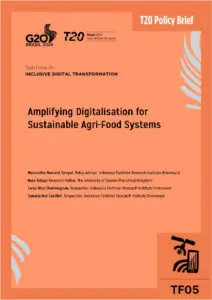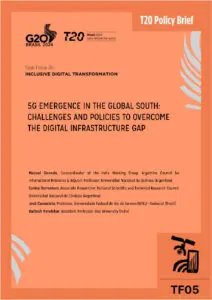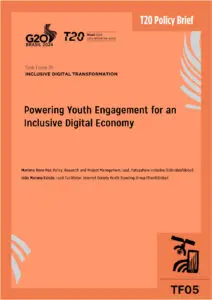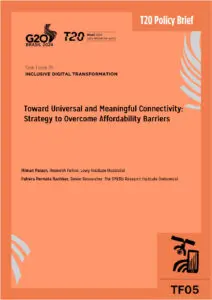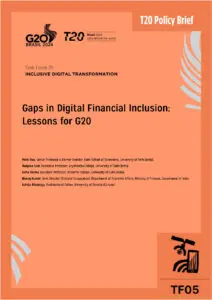You are currently viewing a placeholder content from Youtube. To access the actual content, click the button below. Please note that doing so will share data with third-party providers.
The authors propose measures to prevent a clash between the interests of the middle classes that are in decline in the mature economies and the rising ones in emerging markets. The aim is to stop de-globalization trends, avoid protectionism, foster inclusive technological innovation, compensate the losers of globalization in developed economies and reassure the winners in emerging economies. It is argued that the concept of “inclusive growth” must cover inequalities between countries and within countries, and include technological innovation.
Challenge
The combination in time of some of the effects of the Great Recession/Eurozone crisis (2008-13) and an unequal rate of recovery among and within countries, along with the fairly rapid introduction of new task-automation technology, can give rise to a new type of divergence between and within mature and emergent economies. This could have an impact on the political stability of regimes through a growing sense of rage in the middle and lower-middle classes, which have seen their incomes and position decline in the process, and their upward progress challenged. The feeling of rage has already begun to translate into electoral results and policies.
Globalization has contributed to lift billions of people in the world out of poverty. The slower pace, or even reversal, of globalization could represent a negative shock for the developing world and for parts of some developed countries.
Significant studies (Branko Milanović 2016 a and 2016 b, the World Bank 2016, the International Labour Organisation 2016 and others) have quantified that inequality has fallen at a global level, (although much less leaving out China and the countries of the former Soviet Union) and a global middle class has seen the largest incomes increase in the 1998-2008 period. According to Milanovic, global inequality has decreased from 69 Gini points in 1988 to 64 Gini points in 2011.However, in theadvanced economies inequality has increased, and the middle classes (mid and low) are in decline, due in part to globalization, the effect of the Great Recession and the impact of skill-based technological change.
In a report appropriately titled “Poorer than their parents?”, McKinsey (2016) argued that real incomes in advanced economies between 2005 and 2014 had stagnated or fallen for 65%-70% of households, accounting for more than 540 million people. The report reaches the deeply disturbing conclusion that even a return to strong GDP growth may not eliminate the flat or falling trend as demographic and labour factors weigh on incomes.
There is also the problem of the self perception of the declining middle class, as a Gallup (Newport 2016) poll showed for the US, a tendency that is repeated in some other countries. At any rate, perceptions weigh as heavily as reality when it comes to the political impact of the major issue of the loss of social status in the West. As Dani Rodrik (2016), one of the first to draw attention to this contentious issue, writes, “the frustrations of the middle and lower classes today are rooted in the perception that political elites have placed the priorities of the global economy ahead of domestic needs. Addressing the discontent will require that this perception is reversed”. Historically, societies that have started to decline can take decisions that accelerate the decline. Protectionist reactions might go against the interests of the emerging economies, but also of the developed ones.
There is a growing consensus (Ortega, 2016) that this time the technological revolution will destroy more jobs than it will create in the short and medium terms, and generate more inequality even if the prices of products and services go down. The “share of occupations that could experience significant automation is actually higher in developing countries than in more advanced ones, where many of these jobs have already disappeared”, and this concerns around two thirds of all jobs, according to a report by UNCTAD,(2016). Similarly, in an analysis by Citi, Frey and Osborne (2015) foresee a greater impact on developing countries than on mature economies (computerization could destroy 57% of current jobs in the OCDE area, 47% in the US, 77% in China and 69% in India, in gross terms, even though in net term it will be lower with the creation of “new jobs”, that are not really quantifiable). The richer and more advanced countries are more resilient but, increasingly, more of the jobs affected are middle class. And not only working classes.
According to the International Labor Organization (2016), 40 million new jobs a year are needed just to keep up with the demographic growth of the world’s population and more than 300 million to achieve the Sustainable Development Goals for 2030. These benchmarks are in contradiction with the forecasts quoted above.
Providing an answer to this challenge will also improve the image and profile of globalization and the G20, which is increasingly becoming the target of anti-globalization movements and sentiment.
In sum, it is necessary to ensure that a protectionist backlash in advanced countries is avoided and that both advanced and emerging members of the G20 implement policies to reduce the negative impact of automation in employment, both in advanced and emerging economies. The OECD (2016), has concluded that “trade protectionism shelters some jobs, but worsens prospects and lowers well- being for many others. In many OECD countries, more than 25% of jobs depend on foreign demand”.
Elephant Curve by Branko Milanovic (2016a)
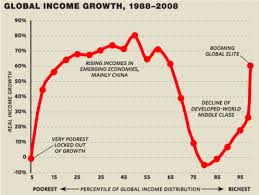
Apart from the data we have provided, the most important and significant chart is the so-called “Elephant Curve” provided by Branko Milanovic, first in 2012 that shows which segments of the global population saw a rise in real incomes from 1988 to 2008, reflected a general growth of middle classes, that has led to a global middle class. But the data stop in 2008 (he later, as said provided new data up to 2012), just when the Great Recession started that had a declassing effect on part of the middle classes of advanced economies.
Proposal
Avoid protectionism and balance globalization
Reinforce World Trade Organization (WTO) rules in trade disputes in order to avoid a regression in trade and cross-border investment practices and the rise of US-led bilateralism.
Avoid breaking the global value chains that have both brought down the costs of products and services and have led to the transfer of technology and know-how to developing economies. But at the same time, the causes and effects of outsourcing must be balanced.
Steadily level the playing field by reducing social dumping. This cannot be done overnight as different social protection systems have been at the root of the growth of many economies from the start. But progress should be made towards fairer competition and the obligation to comply with agreed minimum standards.
The weakening of trade unions –due to global competition, the larger weight of capital (including profits) over labour incomes, decisions taken at the level of the firm and new forms of work that do not produce stable employment (such as the growth in self-employed freelancers)– has played a role in the backlash against globalization in the developed countries. Therefore, there should be more thought on renewed forms of organized labour –using also the communication tools of new technologies- to increase its negotiating profile and bargaining power. In developing countries, labor organizations have often been suppressed, but they could yet be a factor for progress. In particular, given that self employment and part time employment are expected to increase, it would be necessary to find ways for these workers (that are not unionized) to participate in the wage – bargaining. A coordinated increase in minimum wages across countries could also be considered.
Compensate the losers in developed countries
If there is no compensation, the vote for radical or populist alternatives could increase and favor protectionism and de-globalization.
For the major losers of globalization or those displaced by automation, in terms of employment or salaries, income-guarantee schemes should be explored. Even if only for a transitional period and not as a way of organizing a society in the long term, since it is still not known what the ultimate implications of technological change will be.
The EU used the so called “cohesion funds” to compensate the efforts in which some peripheral economies had to engage to adapt to the creation of the single market in the 1980s and 1990s. Some kind of global cohesion fund should be set up in order to compensate the losses suffered by the sections of the most negatively affected societies, whose reward has essentially been access to cheaper products, including technological ones. This fund could be financed by new taxes (as on financial transactions, green house gas emissions, or on air travels), and with public-private compacts like the Marshall Plan with Africa proposed by the German Government (Federal Ministry for Economic Cooperation and Development, Germany (2016).
Permanent education
An overhaul of the education system is necessary to empower and recycle the skills of individuals throughout their working life. This should be done through a public-private compact in each country, taking as a good example the German system of dual apprenticeship, and using the new tools that digital technology enables. There should also be more exchanges of students worldwide.
This has already been treated in the G20 2014 Labour and Employment Declaration, and other documents, that should be put into practice.
The professional empowerment of women is also a necessary policy for these purposes and their education and training is essential.
Reassure the emerging economies
Allow emerging economies to continue growing through the expansion of their own internal demand but also through exports, guaranteeing that the cycle of globalization continues, with corrections.
Help them with technical measures to combat corruption.
Assure a continued but controlled flow of migration, that is needed by developed societies that are getting older. Remittances by immigrants have been a very important contribution to the development of the countries of origin of foreign workers and there should be guarantees that they will continue to be so. Furthermore, many migrants eventually return to their countries of origin.
Inclusive technological progress
(Note: this proposal should be linked to those the task force has for the Digital Economy.)
Technology is a source of growth. The G20’s Blueprint for Innovative Growth (2016) should continue to be the basis for furthering “the importance of inclusiveness to eradicate extreme poverty, reduce inequality and social exclusion and to bridge the digital divide”.
Push for a plan for the digitalization and technologization of Africa and the poorer parts of Asia.
Avoid a digital gap by connecting people of all ages and conditions.
Study in greater detail the impact of automation on employment.
Develop a welfare function of technology for all through greater international cooperation.
Measures against fiscal evasion and elusion
(There is another task force working on this essential topic, as the risk of States losing sources of revenue and resources is crucial and could hinder the implementation of many of the recommendations put forward).
References
- Citi, Carl Benedikt Frey & Michael Osborne (2015): , Citi/Oxford Martin School, February.
“Technology at work: The Future of Innovation and employment” - Corlett, Adams (2016): Resolution Foundation, London,
“Examining an elephant: globalisation and the lower middle class of the rich world” - Federal Ministry for Economic Cooperation and Development, Germany (2016)
- Gallup (Frank Newport, 2016): https://www.gallup.com/poll/182918/fewer-americans-identify-middle-class-recent-years.aspx
“Fewer Americans Identify as Middle Class in Recent Years” - G20 labour and employment ministerial declaration: September 2014,
Preventing structural unemployment, creating better jobs and boosting participation, - G20 Blueprint on Innovative Growth, Hangzhou, 2016,
More Information - International Labor Organisation (2016), Geneva,
“Trends in the world of work: What effects on inequalities and middle-income groups” - McKinsey & Co. (2016), by Richard Dobbs, Anu Madgavkar, James Manyika, Jonathan Woetzel, Jacques Bughin, Eric Labaye & Pranav Kashyap,
“Poorer than their parents? A new perspective on income inequality” - Milanovic, Branko (2016 a), Global Inequality A New Approach for the Age of Globalization, Harvard University Press
- Milanović, Branko, & John E. Roemer (2016 b)
“Interaction of Global and National Income Inequalities” - OECD (2016, November)
Global Economic Outlook - Rodrick, Dani (2016): , Financial Times, October 4th
“There is no need to fret about deglobalisation” - UNCTAD (United Nations Commission on Science and Technology for Development) (2016)
“Issues Paper On Foresight for Digital Development” - World Bank (2016) , Washington DC
“World Development Report 2016: Digital Dividends”



